Kidney Disease & Children- Act Early to Prevent It!

What are Kidneys and how they work?
The kidneys are two bean-shaped organs, located just below the rib cage, one on each side of the spine. The kidneys play a critical role in the body: They act as a filtering system and help control water levels and eliminate wastes through urine. They also help regulate blood pressure, red blood cell production, and the levels of calcium and minerals.
What are the causes of kidney disease in children?
Kidney disease in children can be caused by birth defects, hereditary diseases, infection, nephrotic syndrome, kidney stones, urine blockage or reflux and systemic diseases like diabetes, hypertension.
How can we prevent?
While it is not always possible to prevent all kidney diseases, some of them can be easily controlled by taking simple steps in order to prevent long term kidney damage.
1. Drink lots of water every day: Water keeps you hydrated and helps the kidneys to remove all the toxins from your body. At least 1.5 litres of water a day is must. Not drinking enough fluids can make urine become extra concentrated and increase the likelihood of kidney stones
2. Reduce the intake of salt: Salt increases the amount of sodium in diet. It not only increases blood pressure but also initiates the formation of kidney stones. It is important to quantify the daily salt intake and reduce it whenever possible.
3. Eat and drink Healthy: One should include right foods in diet. Particularly, foods that can strengthen your kidneys like fish, asparagus, cereals, garlic and parsley. Fruits like watermelon, oranges and lemons are also good for kidney health. Drinking fresh juices are one way of drinking more fluids and keeping your kidneys healthy. Avoid drinking coffee and tea.
4. Daily exercises: Doctors believe that obesity is linked to kidney related problems. Exercising can surely help one to lose extra weight and enhance kidney health.
5. Never repel the urge to urinate: Although urinary bladder can hold a lot of urine, the urge to urinate is felt when the bladder is filled. At this time, one has to void urine. If you start ignoring the urge to pass then, the urinary bladder stretches more, and this affects the filtration process of the kidney.
More reads:
1. Kidney disease, chronic-Prevention (http://www.nhs.uk/)
2. Preventing Kidney stones. Harvard Health Publications (http://www.health.harvard.edu/)
3. Penniston KL. Effect of dietary changes on urinary oxalate excretion and calcium oxalate
Article by our collaborator, Dr Manigandan Chandrasekaran is a Consultant in Neonatal Medicine at Cloudnine Hospital in Chennai. He is trained in Neonatal Medicine and joined the Cloud Nine hospitals aiming to deliver high quality care to neonatal infants in India.
Picture Courtesy:
worldkidneyday.org

